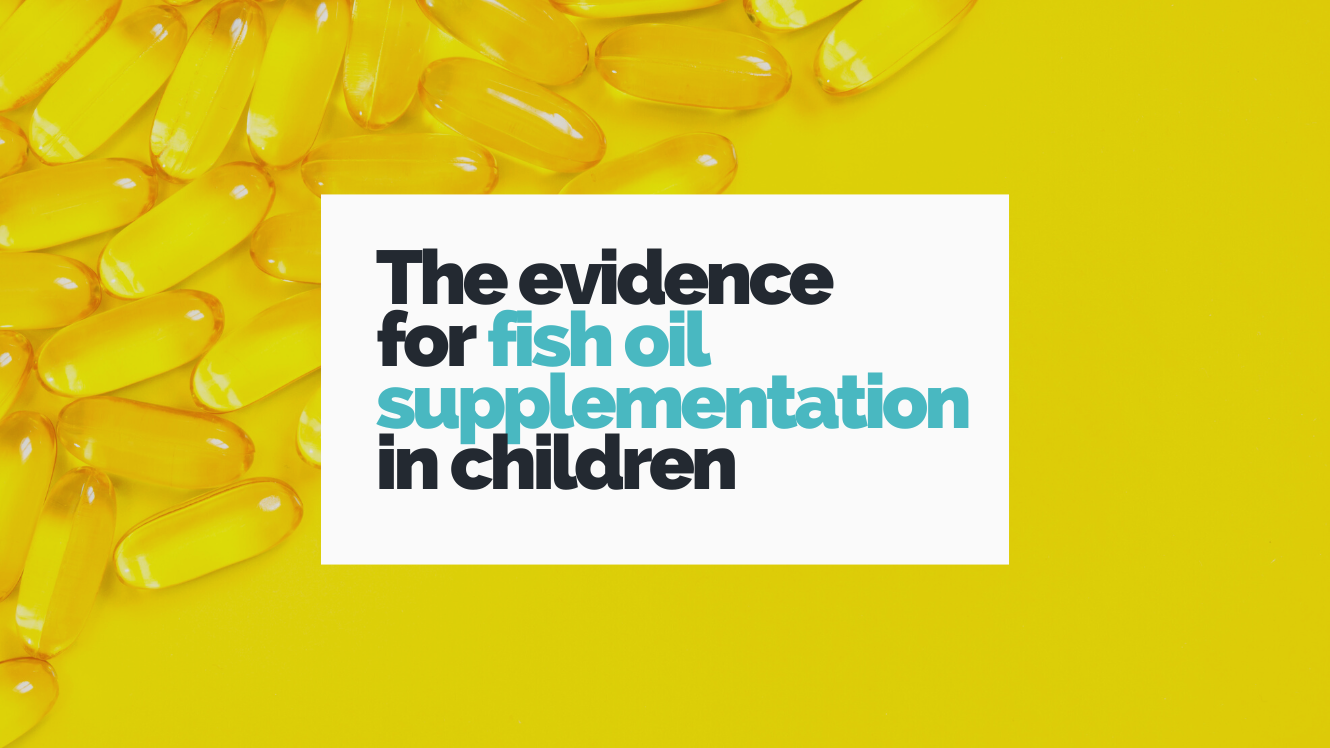
The evidence for fish oil supplementation in children
- 4 ways your child may not tolerate cow’s dairy: allergy, milk protein sensitivity, cerebral folate deficiency, and lactose intolerance - January 3, 2024
- 5-hydroxytryptophan (5-HTP) and the “feel good” neurotransmitter serotonin - October 4, 2023
- Quercetin supplementation for children: research, safety and efficacy - May 13, 2023
What is fish oil? What is the difference between omega-3 and omega-6 fatty acids?
Fish oil is oil extracted from the tissues of oily fish. Its popularity stems from its rich quantity of omega-3 fatty acids, particularly DHA and EPA. Omega-3s play several important roles in the body, including as components of phospholipids that make up the structure of cell membranes, especially in the brain.1 They are converted into eicosanoids which are signaling molecules with a hand in numerous body systems like the cardiovascular, pulmonary, immune, and endocrine systems.1 Eicosanoids are well known for being potent inflammatory mediators, meaning they reduce the overall inflammatory activity in the body.
DHA (docosahexaenoic acid) and EPA (eicosapentaenoic acid) are both omega-3 fatty acids that are found in fish oil. However, they have slightly different chemical structures and functions in the body.
DHA is a long-chain omega-3 fatty acid that is a major component of cell membranes in the brain, retina, and other parts of the nervous system. DHA is particularly important for brain and eye development during infancy and childhood, and it also plays a role in cognitive function, mood regulation, and cardiovascular health.
EPA, on the other hand, is a shorter-chain omega-3 fatty acid that is mainly involved in regulating inflammation and immune function. EPA can be converted into compounds that have anti-inflammatory effects in the body, which may help reduce the risk of chronic diseases such as heart disease, arthritis, and cancer.
Omega-6s are another type of fatty acid and are found to some degree in nuts and seeds, but most Americans get their fill from soybean, corn, safflower, and sunflower oils. Although we need some omega-6s, it’s important to keep the ratio of omega-3/omega-6 relatively even. Once upon a time, this ratio was approximately 1:1 to 1:3, but today it hovers around 1:20 in many Americans.2 This is important because some research suggests a relationship between the omega-3/omega-6 ratio and chronic diseases like cardiovascular disease, cancer, autoimmunity, neurologic diseases, diabetes, and more.1
What’s it used for?
In infants and children, omega-3 supplementation has been shown to have a preventative effect on allergic outcomes, prevalence of wheezing, and use of a bronchodilator. A significant decrease in allergic sensitization and prevalence of cough, and a general reduction in asthma severity have also been reported.8 Although the effect of fish oil supplements in the offspring of supplemented women is limited, the evidence suggests both a preventive and therapeutic effect by giving fish oil supplements directly to the children.
Other conditions
Omega-3 fatty acids have been reported to have a protective role against coronary artery disease, hypertension, dyslipidemia, and chronic inflammatory diseases like diabetes, chronic obstructive pulmonary disease, rheumatoid arthritis, and inflammatory bowel disease.8 The research related to children and these conditions is rather limited, but evidence suggests a benefit in other inflammatory conditions like eczema and asthma.
Who should not take Omega-3 supplements? Are Omega-3 supplements safe in children?
There is some evidence to suggest that taking high doses of fish oil supplements may increase bleeding time in some individuals. Bleeding time refers to the time it takes for a small cut to stop bleeding, and prolonged bleeding time can increase the risk of bleeding disorders and complications during surgery. However, the research is mixed. Some studies in adults have suggested that high doses (above 3 grams per day) may increase bleeding time in some people, particularly those taking blood thinning medications such as aspirin or warfarin. However, other studies have shown no significant effect of fish oil supplements on bleeding time, even in high doses. One large, randomized controlled trial showed less perioperative and postoperative bleeding with patients supplemented with fish oil. Notably, this strong study used very high levels of preoperative fish oil supplements (8-10 grams for 2-5 days prior to the surgery), and moderately high postoperative fish oil supplements (2 grams/day). The study concludes: “Fish oil supplementation did not increase perioperative bleeding and reduced the number of blood transfusions. Higher achieved n-3-PUFA [omega-3-polyunsaturated fatty acid] levels were associated with lower risk of bleeding.” This is strong and compelling evidence for safety, even around the time of surgery. Due to the risk of interactions with blood-thinning medication, fish oil supplementation should be used with caution in patients taking aspirin, warfarin or other anticoagulants.
Other common side effects of fish oil supplementation include unpleasant taste, bad breath, heartburn, nausea, diarrhea, headache, and upset stomach. Most of these side effects can be entirely mitigated by having the patient consume fish oil in the middle of a meal. This author recommends using a small medicine cup, espresso cup, or shot glass with a pre-measured amount of liquid fish oil to be placed by the patient’s plate at mealtime. Encourage the child to swallow the fish oil supplement halfway through their meal.
Keeping fish oil supplements cold can help improve the taste. Surprisingly, many children willingly consume fish oil supplements, even straight off a spoon without complaint. Fish oil supplements should never smell rancid or excessively “fishy.” Any foul-smelling fish oil supplement should be tossed immediately.
What about fermented cod liver oil?
There’s a great deal of controversy surrounding fermented cod liver oil supplements, including claims of specific products being rancid rather than fermented, containing far fewer nutrients and additional cheap oils than were claimed, and a whole host of sourcing issues. Another concern with cod liver oil and fish oil in general is the risk of mercury contamination. Large fish eat smaller fish and mercury from each of their prey can accumulate to unhealthy levels. Fish oil that comes from smaller fish like sardines and anchovies is preferable, especially during pregnancy. These considerations have understandably left many people feeling uncertain about the safety and efficacy of fish oil supplements. My recommendation would be to avoid fermented cod liver oil and select a supplement that meets the criteria listed below.
As with all supplements, quality matters! It’s important to look for a third party tested supplement that has the cGMP seal (Current Good Manufacturing Practice). This seal ensures adherence to a set of regulations assuring the strength, identity, quality, and purity of the product. In addition, look for a supplement with EPA and DHA that comes from fish or algae, not flax oil or “ALA”. Two trusted brands that carry children’s fish oil in gummies or capsules are Nordic Naturals and Now Foods, found easily in many natural health food stores. Seeking Health also sells fish oil sourced from Tilapia, which has extremely low mercury levels, similar to anchovies, and is highly concentrated. Professional-grade brands like Vital Nutrients, Pharmax, Thorne and Designs for Health are also reputable sources.
Vegan and vegetarian alternatives to fish oil
The omega-3s in fish oil actually come from the algae that fish eat. Individuals adhering to a vegan or vegetarian dietary pattern could supplement with an algae oil instead of a fish oil.
Summary:
Fish oil has become a popular supplement and cornerstone of many “functional” health protocols in recent years. Fish oil’s rich omega-3 content makes it a great tool for combating inflammation and managing symptoms associated with chronic inflammatory diseases. High quality fish oil supplements can be a great, low risk addition to a healthy diet. If supplementation does not work for you or your child, focusing on whole food sources of omega-3s from cold water fish like sardines, anchovies, and salmon can support their overall intake. For bonus points, round out their diet with plenty of healthy fats from nuts, seeds, and avocado, and avoid seed oils like safflower, sunflower, soy, canola, cottonseed, grapeseed, and corn oil (hint: they’re hidden in most packaged foods!).
References:
- National Institutes of Health. Omega-3 Fatty Acids. US Department of Health and Human Services. 2022.
- Simopoulos AP. An Increase in the Omega-6/Omega-3 Fatty Acid Ratio Increases the Risk for Obesity. Nutrients. 2016;8(3):128. Published 2016 Mar 2. doi:10.3390/nu8030128
- Genova Diagnostics. Essential and Metabolic Fatty Acids Analysis (EMFA). GDX. 2022.
- Gillies D, Sinn JKh, Lad SS, Leach MJ, Ross MJ. Polyunsaturated fatty acids (PUFA) for attention deficit hyperactivity disorder (ADHD) in children and adolescents. Cochrane Database Syst Rev. 2012;2012(7):CD007986. Published 2012 Jul 11. doi:10.1002/14651858.CD007986.pub2
- Cooper RE, Tye C, Kuntsi J, Vassos E, Asherson P. Omega-3 polyunsaturated fatty acid supplementation and cognition: A systematic review and meta-analysis. J Psychopharmacol. 2015;29(7):753-763. doi:10.1177/0269881115587958
- Cooper RE, Tye C, Kuntsi J, Vassos E, Asherson P. The effect of omega-3 polyunsaturated fatty acid supplementation on emotional dysregulation, oppositional behavior and conduct problems in ADHD: A systematic review and meta-analysis. J Affect Disord. 2016;190:474-482.
- Balic A, Vlasic D, Zuzul K, Marinovic B, Mokos Z. Omega-3 Versus Omega-6 Polyunsaturated Fatty Acids in the Prevention and Treatment of Inflammatory Skin Diseases. Int J Mol Sci. 2020 Feb; 21(3): 741. Published online 2020 Jan 23. doi: 10.3390/ijms21030741
- Muley P, Shah M, Muley A. Omega-3 Fatty Acids Supplementation in Children to Prevent Asthma: Is It Worthy?-A Systematic Review and Meta-Analysis. J Allergy (Cairo). 2015;2015:312052. doi:10.1155/2015/312052
Omega-3s from fish oil are primarily used to moderate inflammation in the body. Fatty acid imbalances have been implicated in a wide range of clinical conditions, including cardiovascular disease, chronic inflammatory conditions, autoimmune conditions, osteoporosis, cognitive decline, mood disorders, neurologic disease, cancer, diabetes, eczema, psoriasis, metabolic syndrome, polycystic ovary syndrome, chronic obstructive pulmonary disease, and asthma.3 It’s important to remember that fish oil is not a cure for any of these conditions, rather it’s one approach to managing the symptoms and inflammation associated with these conditions.
What are the best food sources of Omega-3 fatty acids?
Omega-3s are most commonly found in cold-water fatty fish like salmon, mackerel, tuna, herring, and sardines, while fish with lower fat content have fewer omega-3s.1 Fish get their omega-3 content from consuming algae. Flaxseed, chia seeds, and walnuts are healthy sources of omega-6s.
What are some signs of fatty acid deficiencies?
A deficiency of essential fatty acids (both omega-3s and omega-6s) often impacts the skin and gives us clues about whether supplementation would be beneficial. Signs to look for are rough, scaly skin, dermatitis, and keratosis pilaris (small bumps on the back of the arm (keratosis).
How much should you use?
There are no guidelines for the amount of fish oil that must be consumed daily, but the Adequate Intake of omega-3s has been established and is listed below. These amounts include total Omega-3 fatty acids, combined EPA and DHA.

In clinical practice I typically use double to triple the Adequate Intake listed in the chart above for 2-3 months to replete deficiency. After this time the dose can be reduced to the Adequate Intake of daily supplemental fish oil, or can be consumed through foods.
Fish oil applications:
ADHD
Studies show that children and adolescents with ADHD have significantly lower plasma and blood concentrations of polyunsaturated fatty acids (PUFAs), especially omega-3s.4 This has led researchers to investigate the relationship between supplemental omega-3s and the attention and behavior problems associated with ADHD in children.4 Some data suggests mild improvements with combined omega-3 and omega-6 supplements, while others show positive effects on cognition in children who are omega-3 deficient, but no evidence of improvement in those without a deficiency. Another systematic review looked specifically at the effect of omega-3 supplementation on emotional dysregulation, oppositional behavior, and conduct problems in children with ADHD.6 The studies included in this systematic review were very small and the researchers found little evidence supporting moderate to large beneficial effects. They did, however, find evidence suggestive of small improvements in some children with ADHD on reducing emotional lability and oppositional behavior.6 Overall, the evidence suggests minor improvements in some children with ADHD.
Because of the positive benefits of omega-3 fatty acids on overall general health (reduction of inflammation, prevention of autoimmune disorders, improvement of skin conditions, etc.), I recommend all children with ADHD to take a fish oil supplement for a minimum of 3 months as a trial. Though not all children will see improvements in their ADHD, the risk of supplementation is extremely low (essentially nonexistent), and the potential for positive health changes is very high.
Infant health and neurodevelopment
Many studies have examined the effects of maternal omega-3 intake and infant health outcomes such as birth weight, cognitive development, length of gestation, and visual motor skills.1 Some clinical trials have looked at the effect of supplemental fish oil with EPA and/or DHA during pregnancy and early infancy health and neurodevelopment.1 The results vary by study, but some show heavier birth weights and a decreased risk of preterm delivery in mothers who supplemented with fish oil compared to those who received a placebo.1 Another study showed that infants who were given fish oil supplements daily from birth to six months had significantly better performance on language assessment, but no differences in other neurodevelopmental assessments.1 The current recommendation is that mothers consume at least eight ounces of seafood containing DHA per week to support brain growth and development in their offspring. Low mercury fish like sardines and anchovies are the safest way to meet these needs!
Eczema
There are many reports of fish oil improving dermatitis or eczema symptoms in children and adults. In fact, fish oil supplements taken during pregnancy have been shown to improve clinical severity of eczema in the first year of the child’s life, and infants breastfed by mothers taking fish oil had a lower prevalence of eczema.7 Fish oil generates these effects by improving skin barrier function, skin cell maturation and differentiation, and inhibiting eicosanoids, cytokines, and mast cells, all of which result in an anti-inflammatory effect in the skin.7 Furthermore, both omega-3s and omega-6s have been found efficacious for many other inflammatory skin conditions like psoriasis and acne.7 Overall, omega-3s found in fish oil have numerous preventative and therapeutic effects in individuals with eczema. Fish oil supplementation is a foundational naturopathic treatment approach, in this author’s opinion.
Asthma
Inflammatory skin conditions like eczema are often the first sign of other allergy-related symptoms such as asthma. One large systematic review found inconsistent results in regard to maternal omega-3 intake during pregnancy and outcome of childhood allergic diseases like eczema and asthma. However, the researchers did conclude that the overall findings were “suggestive of a protective association between high maternal intakes of omega-3s or fish oil and incidence of allergic disease symptoms of the offspring”.1
In infants and children, omega-3 supplementation has been shown to have a preventative effect on allergic outcomes, prevalence of wheezing, and use of a bronchodilator. A significant decrease in allergic sensitization and prevalence of cough, and a general reduction in asthma severity have also been reported.8 Although the effect of fish oil supplements in the offspring of supplemented women is limited, the evidence suggests both a preventive and therapeutic effect by giving fish oil supplements directly to the children.
Other conditions
Omega-3 fatty acids have been reported to have a protective role against coronary artery disease, hypertension, dyslipidemia, and chronic inflammatory diseases like diabetes, chronic obstructive pulmonary disease, rheumatoid arthritis, and inflammatory bowel disease.8 The research related to children and these conditions is rather limited, but evidence suggests a benefit in other inflammatory conditions like eczema and asthma.
Who should not take Omega-3 supplements? Are Omega-3 supplements safe in children?
There is some evidence to suggest that taking high doses of fish oil supplements may increase bleeding time in some individuals. Bleeding time refers to the time it takes for a small cut to stop bleeding, and prolonged bleeding time can increase the risk of bleeding disorders and complications during surgery. However, the research is mixed. Some studies in adults have suggested that high doses (above 3 grams per day) may increase bleeding time in some people, particularly those taking blood thinning medications such as aspirin or warfarin. However, other studies have shown no significant effect of fish oil supplements on bleeding time, even in high doses. One large, randomized controlled trial showed less perioperative and postoperative bleeding with patients supplemented with fish oil. Notably, this strong study used very high levels of preoperative fish oil supplements (8-10 grams for 2-5 days prior to the surgery), and moderately high postoperative fish oil supplements (2 grams/day). The study concludes: “Fish oil supplementation did not increase perioperative bleeding and reduced the number of blood transfusions. Higher achieved n-3-PUFA [omega-3-polyunsaturated fatty acid] levels were associated with lower risk of bleeding.” This is strong and compelling evidence for safety, even around the time of surgery. Due to the risk of interactions with blood-thinning medication, fish oil supplementation should be used with caution in patients taking aspirin, warfarin or other anticoagulants.
Other common side effects of fish oil supplementation include unpleasant taste, bad breath, heartburn, nausea, diarrhea, headache, and upset stomach. Most of these side effects can be entirely mitigated by having the patient consume fish oil in the middle of a meal. This author recommends using a small medicine cup, espresso cup, or shot glass with a pre-measured amount of liquid fish oil to be placed by the patient’s plate at mealtime. Encourage the child to swallow the fish oil supplement halfway through their meal.
Keeping fish oil supplements cold can help improve the taste. Surprisingly, many children willingly consume fish oil supplements, even straight off a spoon without complaint. Fish oil supplements should never smell rancid or excessively “fishy.” Any foul-smelling fish oil supplement should be tossed immediately.
What about fermented cod liver oil?
There’s a great deal of controversy surrounding fermented cod liver oil supplements, including claims of specific products being rancid rather than fermented, containing far fewer nutrients and additional cheap oils than were claimed, and a whole host of sourcing issues. Another concern with cod liver oil and fish oil in general is the risk of mercury contamination. Large fish eat smaller fish and mercury from each of their prey can accumulate to unhealthy levels. Fish oil that comes from smaller fish like sardines and anchovies is preferable, especially during pregnancy. These considerations have understandably left many people feeling uncertain about the safety and efficacy of fish oil supplements. My recommendation would be to avoid fermented cod liver oil and select a supplement that meets the criteria listed below.
As with all supplements, quality matters! It’s important to look for a third party tested supplement that has the cGMP seal (Current Good Manufacturing Practice). This seal ensures adherence to a set of regulations assuring the strength, identity, quality, and purity of the product. In addition, look for a supplement with EPA and DHA that comes from fish or algae, not flax oil or “ALA”. Two trusted brands that carry children’s fish oil in gummies or capsules are Nordic Naturals and Now Foods, found easily in many natural health food stores. Seeking Health also sells fish oil sourced from Tilapia, which has extremely low mercury levels, similar to anchovies, and is highly concentrated. Professional-grade brands like Vital Nutrients, Pharmax, Thorne and Designs for Health are also reputable sources.
Vegan and vegetarian alternatives to fish oil
The omega-3s in fish oil actually come from the algae that fish eat. Individuals adhering to a vegan or vegetarian dietary pattern could supplement with an algae oil instead of a fish oil.
Summary:
Fish oil has become a popular supplement and cornerstone of many “functional” health protocols in recent years. Fish oil’s rich omega-3 content makes it a great tool for combating inflammation and managing symptoms associated with chronic inflammatory diseases. High quality fish oil supplements can be a great, low risk addition to a healthy diet. If supplementation does not work for you or your child, focusing on whole food sources of omega-3s from cold water fish like sardines, anchovies, and salmon can support their overall intake. For bonus points, round out their diet with plenty of healthy fats from nuts, seeds, and avocado, and avoid seed oils like safflower, sunflower, soy, canola, cottonseed, grapeseed, and corn oil (hint: they’re hidden in most packaged foods!).
References:
- National Institutes of Health. Omega-3 Fatty Acids. US Department of Health and Human Services. 2022.
- Simopoulos AP. An Increase in the Omega-6/Omega-3 Fatty Acid Ratio Increases the Risk for Obesity. Nutrients. 2016;8(3):128. Published 2016 Mar 2. doi:10.3390/nu8030128
- Genova Diagnostics. Essential and Metabolic Fatty Acids Analysis (EMFA). GDX. 2022.
- Gillies D, Sinn JKh, Lad SS, Leach MJ, Ross MJ. Polyunsaturated fatty acids (PUFA) for attention deficit hyperactivity disorder (ADHD) in children and adolescents. Cochrane Database Syst Rev. 2012;2012(7):CD007986. Published 2012 Jul 11. doi:10.1002/14651858.CD007986.pub2
- Cooper RE, Tye C, Kuntsi J, Vassos E, Asherson P. Omega-3 polyunsaturated fatty acid supplementation and cognition: A systematic review and meta-analysis. J Psychopharmacol. 2015;29(7):753-763. doi:10.1177/0269881115587958
- Cooper RE, Tye C, Kuntsi J, Vassos E, Asherson P. The effect of omega-3 polyunsaturated fatty acid supplementation on emotional dysregulation, oppositional behavior and conduct problems in ADHD: A systematic review and meta-analysis. J Affect Disord. 2016;190:474-482.
- Balic A, Vlasic D, Zuzul K, Marinovic B, Mokos Z. Omega-3 Versus Omega-6 Polyunsaturated Fatty Acids in the Prevention and Treatment of Inflammatory Skin Diseases. Int J Mol Sci. 2020 Feb; 21(3): 741. Published online 2020 Jan 23. doi: 10.3390/ijms21030741
- Muley P, Shah M, Muley A. Omega-3 Fatty Acids Supplementation in Children to Prevent Asthma: Is It Worthy?-A Systematic Review and Meta-Analysis. J Allergy (Cairo). 2015;2015:312052. doi:10.1155/2015/312052







